From her home in East Jerusalem, Tanya Habjouqa occasionally hears warning sirens wailing. The Jordanian-born photographer and writer with strong Fort Worth roots is a relatively safe distance from the battle zone, but the area where she lives is not immune to the devastation that is currently (and perpetually) gripping the Middle East.
The Palestinian teenager who was kidnapped and burned to death was five minutes from where she lives when he was abducted.
Habjouqa, an Arlington Heights graduate and University of North Texas alumnus, is married to a Palestinian; their two children were born in East Jerusalem. Though she never intended to raise a family and make a life amid the chaos of the region, the struggle of the Palestinian people — their loss of identity and humanity, their untold story — has become one of the driving forces behind Habjouqa’s work.
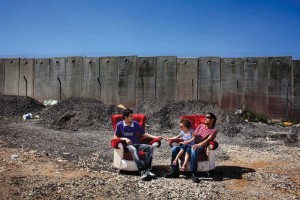
As a photojournalist for the Bloomberg News and various nongovernmental organizations, she’s had a front-row seat for the suffering and devastation of wars and humanitarian crises in Lebanon, Darfur, Iraq, and Gaza.
Habjouqa said the experience made her cynical about how news organizations cover the Middle East and war. She was frustrated with the clichéd photographs the news agencies wanted her to shoot. She resolved to change the way she treated her subject matter.
“I hated the entire approach,” she said. “The pictures they selected were not the ones that told a story. There was no nuance, no context. I vowed at that point … that isn’t who I am. There are enough assholes with cameras.”
Since then, her work has earned worldwide acclaim. She recently won a prestigious World Press Award for her series Occupied Pleasures, a glimpse into the everyday lives of people in Gaza, the West Bank, and East Jerusalem. The photos show the resiliency and humor of a people who live under the looming threat of violence.
Her work has appeared in museums and galleries all over the world. Her Women of Gaza series is a part of the permanent collection of the Museum of Fine Arts, Boston.
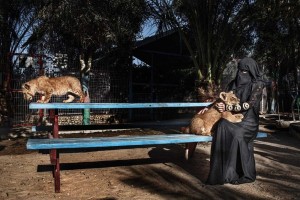
Habjouqa began her career as an intern and later as a freelance photographer for Fort Worth Weekly, where she tackled such topics as urban poverty. It was here that she developed her sense of justice and her fearlessness.
From behind her lens, the energetic photographer brings new perspectives to the portrayal of often-misunderstood people, picking their cultural scabs and forcing the viewer to see them as human. She brings sensitivity to topics like transsexuals in Palestine, Arab body builders, heroin addicts in Jerusalem, and the lives of women in Gaza.
“The Middle East is one of the most stereotyped places on earth,” she said. “It’s one of the places where quite often people don’t get the story right. I feel an obligation to make people go beyond the stereotypes. There’s an obligation to the person who is trusting you with their story.
“I try to utilize an approach that you don’t use the same tired tropes,” she said of her photography style. “I try to find quirky angles to make you think, to look at it differently.”
********
Since childhood, Habjouqa has always had one foot in Texas and one in the Arab world. Her parents moved to Texas, where her mother had been born, when she was 4, and she spent many summers visiting her extended family back in Jordan. The two cultures, she said, have more in common than the residents of either place might think.
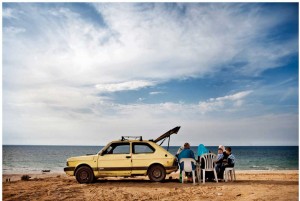
“I defend Texas all of the time,” she said. “There’s this idea of Texas as backward, conservative, and redneck — which is ironic because most Texans would probably think the same of the Middle East.
“The reality of both places is that you’ve got a damn funny place, great humor, and great hospitality.”
Seeing both cultures up close has allowed her to dismiss stereotypes about both places.
“Because I was born in Jordan and spent summers there, I was always going between narratives,” she said. “When the Iraq war [began], I was in the U.S. watching the media, and two weeks after it started, I was in Jordan watching how differently it was being perceived. So I’ve always been very sensitive to narrative.”
One of her formative experiences as a photographer came while working with the late Betty Brink on a story for the Weekly. While looking for subjects for a story about poverty in East Fort Worth, she and the longtime reporter met a single black mother who agreed to be photographed. As she posed the woman in front of her dilapidated house while holding her baby, Habjouqa realized she had reduced the woman to a cliché.
“She said, ‘Please don’t make me look like no ghetto mamma,’ ” Habjouqa recalled. “And I instantly realized I was [doing] that. She was there holding her baby, and I just moved in closer. She held the baby up, and I got this beautiful portrait of her looking the baby in the face. I thought [the Weekly] would never go for this, and it ended up being the opening double spread” — that is, the lead photograph in a two-page layout that started the story.
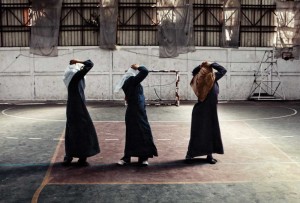
“I was so proud, and I made sure she got a copy,” Habjouqa said. “That was a turning point for me.”
While she was a student at UNT, local photographer, installation artist, and painter Christopher Blay invited Habjouqa to join F8, a photography collective, though he was initially skeptical of her.
“She joined us after our first show,” he said. “The first body of work she showed me were images of the homeless in Denton and Fort Worth. I remember being very critical of her work. I was concerned that they were drive-by shots of people down on their luck, but there was enough genuine connection to what she was doing that made it easy to work with her. And she went on to prove me very wrong.”
Habjouqa moved back to the Middle East in 2002 and has remained there ever since. While working for various news organizations to pay the bills, she also takes on personal art projects from time to time.
In 2009, after another round of Israeli attacks on Gaza, she decided to focus on showing what it was like to be a woman there. Because of the complicated politics of the region, she had difficulty gaining access –– the Israeli military blockade of Gaza makes passage in and out of the area nearly impossible. She posed as a photographer for a nongovernmental organization and was allowed in. The photographs she took on that trip make up the exhibit that now hangs at the Museum of Fine Arts, Boston.
“It’s not easy to get access to intimate moments with [Arab] women,” she said. “And when they do let you in, you have an obligation to be respectful. I always say I’m not successful in any of my projects if the people don’t recognize themselves, if it doesn’t resonate with them as well.”
********
In 2009, Habjouqa met and fell in love with Azem Bishara, a Palestinian-born attorney working in East Jerusalem. They married less than a year later, and she became fully indoctrinated into the complicated politics and frequent headaches of living as a Palestinian in Israel — or as she would say, in occupied territory.
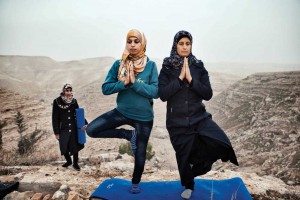
The inspiration for her most celebrated work to date, Occupied Pleasures, came to her while she waited at a military checkpoint.
“I remember there was a little boy who decided to defy [the Israeli military], and he was inching forward and inching forward,” she said. “A man in the guard tower was yelling at him in Arabic, ‘Go back,’ and the little boy just stuck his tongue out, as he was looking up at the tower.
“I laughed and laughed, and that’s how I got the idea,” she said. “Once I got the name, Occupied Pleasures, that was it. When it came to me, everything fell into place.”
She applied for a grant from the renowned Magnum Foundation, a photo agency based in Paris and New York, and was one of 10 (out of hundreds) of photographers who received funding.
Habjouqa might not have made it out of Gaza had she not been four months pregnant. Because of the various restrictions on her passport, the Israelis would not allow her back into East Jerusalem from Gaza. Instead of going directly home, she had to take a bus to Egypt and enter East Jerusalem from that direction. Even then, she was almost turned back by Egyptian border guards. They relented when she pretended to go into labor.
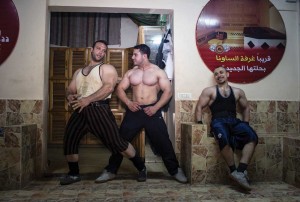
“I had to pretend I was giving birth to get out,” she said. “It almost backfired on me, because I was screaming for a doctor. And they said, ‘We have a doctor here.’ When I went in, it was five men in dirty lab coats chain-smoking. I asked if they had a woman doctor, and they said no.”
The guards let her through to Egypt.
While in Gaza, she documented the lives of a resilient people who use a sharp sense of humor to deal with the absurdities of their living conditions. She photographed a group of women doing yoga, children swimming in a plastic pool in the middle of the rocky landscape, and a young bride shopping for her wedding dress.
These days she’s teaching workshops and still doing some freelance photography. She is a founding member of Rawiya, a photo collective made up of women from all around the Middle East.
“When I talk to students here, one of the things I always start with is [the] story from my first investigative piece I did with Betty Brink,” she said.
Though she visited Texas earlier this year, she hasn’t made it back to Fort Worth in more than a decade. But she still considers herself a Texan.
“I’m very emotional about Fort Worth,” she said. “It’s where I became who I was. I don’t say I’m American. I say I’m Texan.”
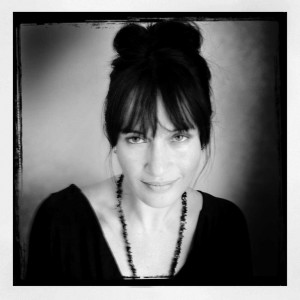
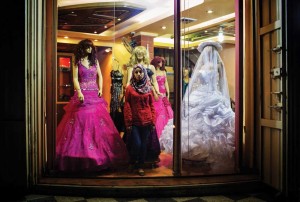
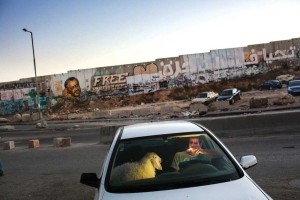



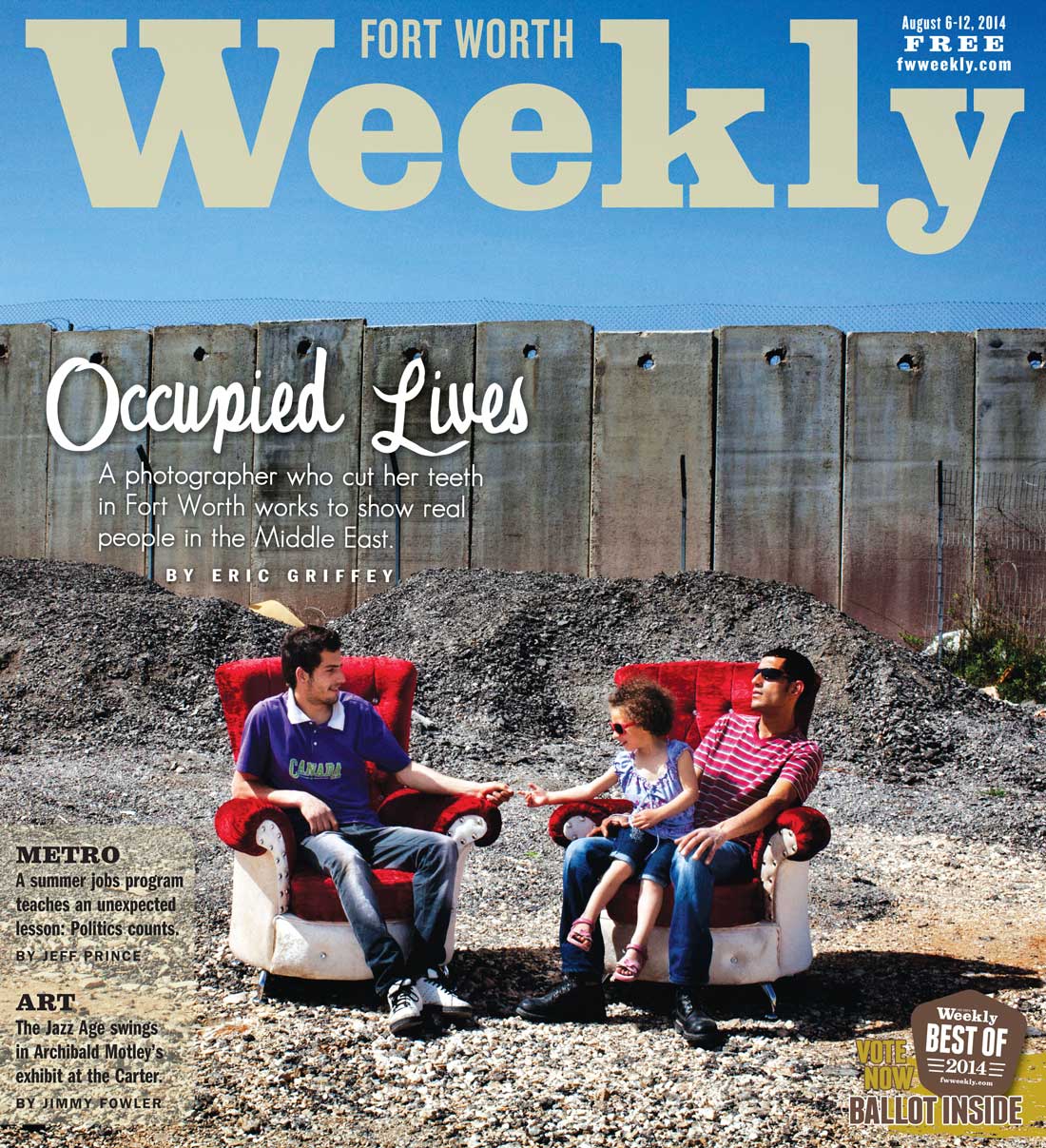

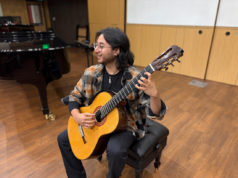

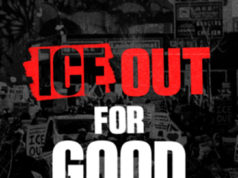





Wonderful photos! Thank you for sharing your very human portraits of Palestinians and Palestine!